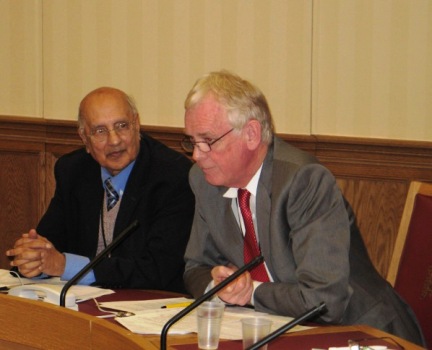![]()
The Words of the Marsh Family
|
|
The Words of the Marsh Family |

David Wardrop, Chair, Westminster United Nations Association
London, England -- A discussion of 'Genocide Awareness and Holocaust Commemoration' was held in the House of Lords, Committee Room 4A on February 1. Universal Peace Federation's Community Cohesion Working Group held this event to promote awareness of 'the path to genocide,' to assist in identifying future problems before they occur, and to consider the capacity for intervention in current or future tragedies.
This program was aimed to promote awareness of the 'Path to Genocide' and to focus attention on the recently passed UN Resolution, the 'Responsibility to Protect' soon after the internationally recognized Holocaust Memorial Day. It was held in the House of Lords, Committee Room 4A organized by the Universal Peace Federation's Community Cohesion Working Group who identify with the UPF vision of humankind as 'One Family Under God.'
Robin Marsh explained that, "Genocide is defined as any of the following acts committed with intent to destroy, in whole or in part, a national, ethnical, racial or religious group, by killing members of the group; causing serious bodily or mental harm to members of the group; deliberately inflicting on the group conditions of life calculated to bring about its physical destruction in whole or in part; imposing measures intended to prevent births within the group; and forcibly transferring children of the group to another group."
He quoted Gregory H. Stanton, President of Genocide Watch, who describes eight stages of the 'Path to Genocide' as Classification, Symbolization, Dehumanization, Organization, Polarization, Preparation, Extermination and Denial. At each stage Stanton has suggested appropriate actions that can be taken by the international community. Marsh concluded that an Inter-religious Council, especially at the United Nations, as conceived by the founding purpose of the UPF, could be a useful forum for dialogue to respond to these tragedies at an early stage.
Lawrence Joffe, an author and historian, spoke of the horror of the Holocaust, expressing his fortune at being born of a family whose grandmother was able to escape on one of the last ships from Germany to South Africa before the war. He referred to two types of people who feel guilty: the perpetrator and the survivor. The Germans are very remorseful for the actions of their predecessors. The surviving Jews also feel very guilty for surviving when so many did not.
Quoting Raul Hildberg, Lawrence Joffe said that there are only three types of people in these extreme situations. 'The perpetrator, the victim and the bystander.' He added that there should also be two other categories: the collaborator and the survivor. He explained the lack of countries willing to receive Jewish refugees in 1935, when only the Dominican Republic offered to receive Jewish refugees from many nations of the world, was an example of the bystander. He added that it was ironic that the Ashkenazi Jewish people thought that Germany was the most advanced nation in the world at that time and had felt very comfortable and accepted in German society. However Hitler in 1920 had said, "It is our duty to whip up the instinctive revulsion of the Jews." Of the 9 million Jews in Europe in 1939, approximately 6 million were killed. For example 90 percent of Jews in Poland were killed.
For Ruth Barnett, one of the 10,000 kindertransport children who were saved, the guilt of survival has led her to being a Holocaust educator. Since beginning her campaign for greater awareness of the Holocaust, Ruth Barnett has also been active in campaigns for the recognition of the Armenian genocide and other human rights issues.
David Wardrop spoke of the UN Resolution in October 2009 that established the 'Responsibility to Protect' as well as the International Criminal Court current situation. He added that both were weak but that at least they were on the agenda and could be strengthened. He explained that 'We the people' must challenge Governments to champion the role of 'Responsibility to Protect' provisions. He concluded that civil society and media have an important role to play in developing the capacity of the international community to act in the case of an ongoing genocide.
Lord King of West Bromwich in his opening remarks emphasized that UPF believes that humankind is 'One Family Under God'. He explained that Father Moon had suffered greatly to find the heart to love all people. He added that loving families would be at the core of peace in the future. Such families would form peaceful nations and a peaceful world.
Dr. Pilikian Khatchatur described the parallels between the Armenian genocide and the Holocaust in which he said one million Armenians are estimated to have died. He quoted Hitler's comment on the treatment of Armenians, "Ataturk has two great students in this world, Mussolini and I."
Dr. Hojjat Ramzy explained the circumstances of ethnic cleansing in Bosnia especially with the genocide of Bosniac Muslims in Srebrenica and the use of rape as a weapon of war. Marie-lyse Numuhoza described her experience of conflict in Rwanda that led to the genocidal killings of Tutsi people. Rachel Francis-Ingham described the suffering of the Gypsy or Roma people of whom 350,000 were estimated to have died in the Holocaust (see full speech). There are serious health issues in a refugee camp of Roma people in Kosovo currently, she said. Mr. Paramjit Singh described the 'premeditated killing of 500,000 Sikhs' and 'mass rapes of Sikh women' in June and October 1984 mainly in the Punjab, India as a Sikh genocide.